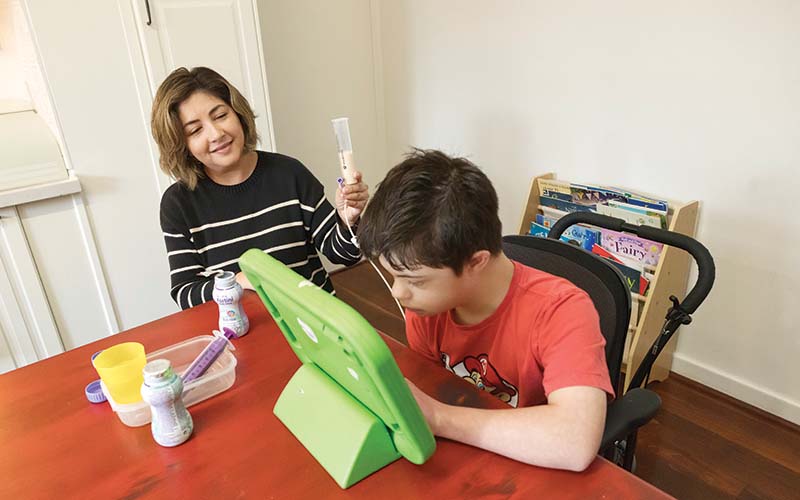Search
Research
Comparing home polysomnography with transcutaneous CO2 monitoring to laboratory polysomnography in children with neuromuscular disordersClinical utility of home polysomnography in children with neuromuscular disorders is limited by lack of evidence that sleep-disordered breathing can be reliably identified and inability to diagnose hypoventilation because carbon dioxide is not measured.
Research
Co-design of the neurodevelopment assessment scaleNeurodevelopmental disorders (NDDs) have high comorbidity rates and shared etiology. Nevertheless, NDD assessment is diagnosis-driven and focuses on symptom profiles of individual disorders, which hinders diagnosis and treatment. There is also no evidence-based, standardized transdiagnostic approach currently available to provide a full clinical picture of individuals with NDDs. The pressing need for transdiagnostic assessment led to the development of the Neurodevelopment Assessment Scale.
Research
Participation predictors for leisure-time physical activity intervention in children with cerebral palsyTo determine the predictors of magnitude of change in response to a participation-focused leisure-time physical activity intervention in children with cerebral palsy (CP) using the ParticiPAte CP protocol.
Research
Communication of individuals with CDKL5 deficiency disorder as observed by caregivers: A descriptive qualitative studyCDKL5 deficiency disorder (CDD) is a genetically caused developmental epileptic encephalopathy that causes severe communication impairments. Communication of individuals with CDD is not well understood in the literature and currently available measures are not well validated in this population. Accurate and sensitive measurement of the communication of individuals with CDD is important for understanding this condition, clinical practice, and upcoming interventional trials.
Research
Behavior Change Techniques Involved in Physical Activity Interventions for Children with Chronic Conditions: A Systematic ReviewBehavior change techniques (BCTs) have been extensively used in physical activity interventions for children, however, no systematic reviews have synthesized their effects.
Research
Parent-reported outcome measures evaluating communication in individuals with rare neurodevelopmental disorders: A systematic reviewCommunication impairments are a leading concern for parent caregivers of individuals with rare neurodevelopmental disorders. Clinical trials of disease modifying therapies require valid and responsive outcome measures that are relevant to individuals with RNDDs. Identifying and evaluating current psychometric properties for communication measures is a critical step towards the selection and use of appropriate instruments.
Research
Fine-grained Fidgety Movement Classification using Active LearningTypically developing infants, between the corrected age of 9-20 weeks, produce fidgety movements. These movements can be identified with the General Movement Assessment, but their identification requires trained professionals to conduct the assessment from video recordings.
Research
Deletions in the CDKL5 5 untranslated region lead to CDKL5 deficiency disorderPathogenic variants in the cyclin-dependent kinase-like 5 (CDKL5) gene are associated with CDKL5 deficiency disorder (CDD), a severe X-linked developmental and epileptic encephalopathy.

For thousands of children around Australia with intellectual and other disabilities, the process of eating can be traumatic, posing challenges that veer from uncomfortable to life threatening.
Research
How Families Manage the Complex Medical Needs of Their Children with MECP2 Duplication SyndromeMECP2 duplication syndrome (MDS) is a rare, X-linked, neurodevelopmental disorder resulting from the duplication of the methyl-CpG-binding protein 2 (MECP2) gene. The clinical features of MDS include severe intellectual disability, global developmental delay, seizures, recurrent respiratory infections, and gastrointestinal problems. The aim of this qualitative study was to explore how the parents of children with MDS manage their child's seizures, recurrent respiratory infections, and gastrointestinal symptoms, and the impact on them as parents.
